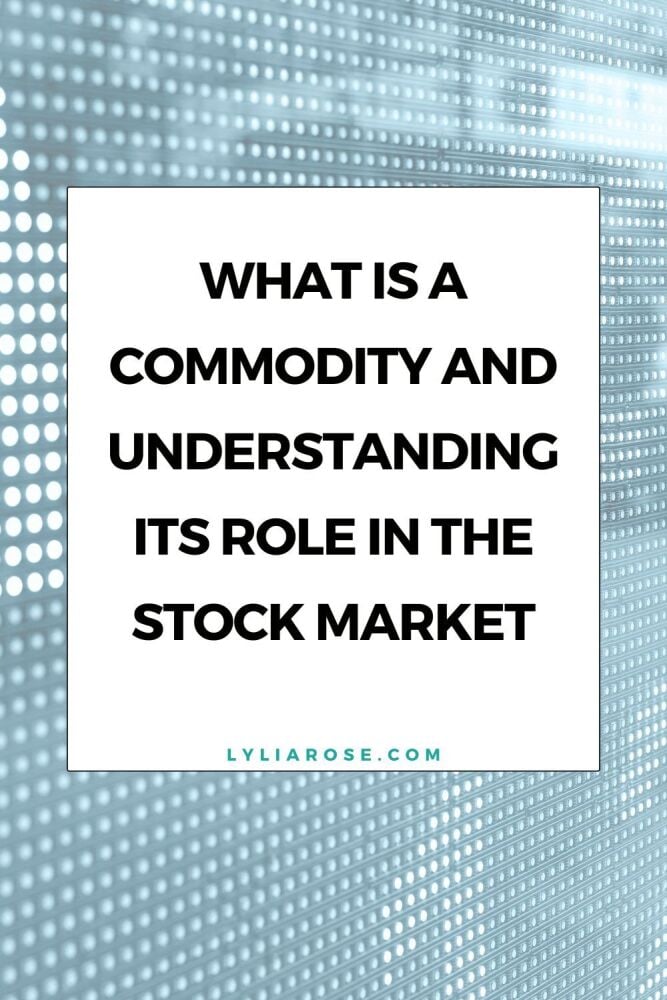What Is a Commodity and Understanding Its Role in the Stock Market
Posted on
Commodities are a unique and fascinating asset class that plays a significant role in the global economy. Whether you're a seasoned trader or just starting to dip your toes into the world of investing, understanding what commodities are and their role in the stock market can be a valuable addition to your financial knowledge.

What Are Commodities?
Commodities are raw materials or primary agricultural products that can be bought and sold. They are the building blocks of our modern world, encompassing a vast range of tangible goods, from crude oil and gold to wheat and coffee. Commodities can be divided into two main categories:
-
Hard Commodities: These include natural resources like metals (e.g., gold, silver, copper), energy sources (e.g., oil, natural gas), and agricultural products (e.g., wheat, soybeans). Hard commodities are typically extracted or harvested from the earth.
-
Soft Commodities: Soft commodities, on the other hand, are agricultural products that are grown rather than mined. This category includes goods like coffee, cocoa, cotton, and sugar.
Why Are Commodities Important?
Commodities hold a pivotal role in our global economy for several reasons:
-
Price Discovery: Commodity markets are often considered leading indicators of economic health. Changes in commodity prices can provide insights into supply and demand dynamics and, consequently, the overall economic climate.
-
Diversification: Investing in commodities can be an effective way to diversify your portfolio. Unlike stocks and bonds, commodities tend to have low correlation with traditional asset classes, which can help spread risk.
-
Inflation Hedge: Certain commodities, such as gold and silver, have historically served as hedges against inflation. When the value of paper currency declines, the value of these precious metals often rises.
-
Global Trade: Commodities are at the heart of international trade. They are bought and sold across borders, making them a critical component of the global supply chain.
Commodities in the Stock Market
Commodities are not only tangible goods but also tradable financial instruments. They are bought and sold through various platforms, including commodity exchanges and the Forex (foreign exchange) market. Here's how commodities intersect with the stock market:
-
Commodity Futures: One common way to trade commodities in the stock market is through commodity futures contracts. These contracts allow you to buy or sell a specific quantity of a commodity at a predetermined price on a future date.
-
Commodity ETFs: Exchange-traded funds (ETFs) offer a more accessible way for individual investors to gain exposure to commodities. Commodity ETFs track the price movements of specific commodities or commodity indices, allowing investors to trade them like stocks.
-
Commodity Stocks: Some companies are directly involved in the production and distribution of commodities. Investing in these companies' stocks can be another way to gain exposure to the commodity market. For example, an oil company's stock price may correlate with the price of crude oil.
How to Start Commodity Forex Trading
Now, let's touch on the topic you're interested in – how to start commodity Forex trading. While Forex trading primarily involves currencies, you can also trade certain commodities through Forex brokers. Here are some steps to get started:
-
Educate Yourself: Before diving into commodity Forex trading, it's crucial to understand the basics of Forex trading, including how currency pairs work, leverage, and risk management.
-
Choose a Reputable Forex Broker: Select a Forex broker that offers access to commodity trading. Ensure they are regulated and have a good reputation in the industry.
-
Analyse the Market: Use technical and fundamental analysis to assess the commodity's price trends and potential trading opportunities.
-
Practice with a Demo Account: Most Forex brokers offer demo accounts that allow you to practice trading with virtual money. This is an excellent way to hone your skills before risking real capital.
-
Start Small: When you're ready to start trading with real money, begin with a small investment. Remember that commodity Forex trading can be volatile, so managing risk is crucial.
-
Stay Informed: Stay up-to-date with news and events that can impact the commodity markets. Geopolitical developments, weather patterns, and economic reports can all influence prices.
Commodities are a vital component of the global economy, and they play a significant role in the stock market. Understanding how commodities work and their relationship with other asset classes can be a valuable addition to your investment knowledge.
